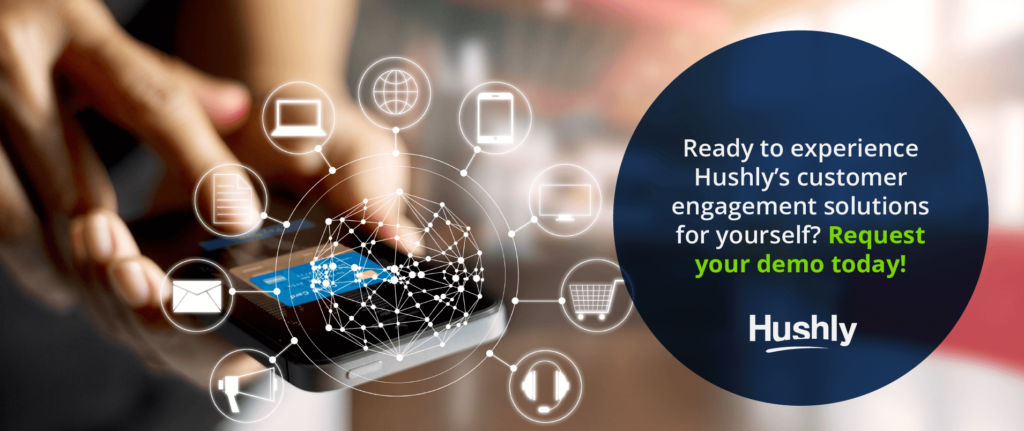With the onset of the global pandemic came an explosion in online transactions, not only in the B2C community, but amongst B2B buyers as well. According to McKinsey, more than 90% of B2B companies shifted to a virtual sales model due to nearly 70% of consumers preferring the option to conduct their business remotely. However, to do this, many companies were forced to rethink their outdated sales strategy, which had primarily focused on in-person interactions and phone calls. Instead, they had to develop a B2B omnichannel experience encompassing email, web, social, and mobile channels.
With research showing that 90% of B2B professionals believe these virtual models are here to stay, and only 25% of B2B buyers saying that they would like to return to in-person interactions, should you be considering incorporating a B2B omnichannel experience into your sales and marketing strategies?
Absolutely – and here’s why.
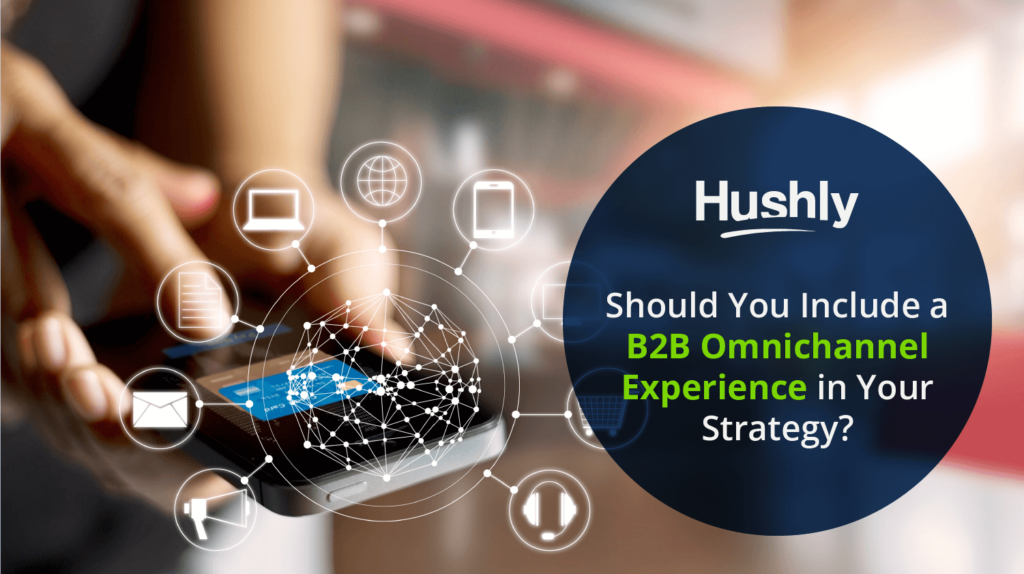
What is a B2B Omnichannel Experience?
A B2B omnichannel experience is an umbrella term that refers to the experience a company provides its customers through various channels – both digital and in-person.
However, with more B2B buyers using the internet to research products and services prior to purchasing, the role of the internet in the B2B sales process has changed dramatically. Today, the internet is not just a tool for prospect research, but a means of capturing and nurturing leads, providing education, and facilitating sales. This has led to a shift away from in-person B2B sales toward an omnichannel experience similar to those offered to the B2C community.
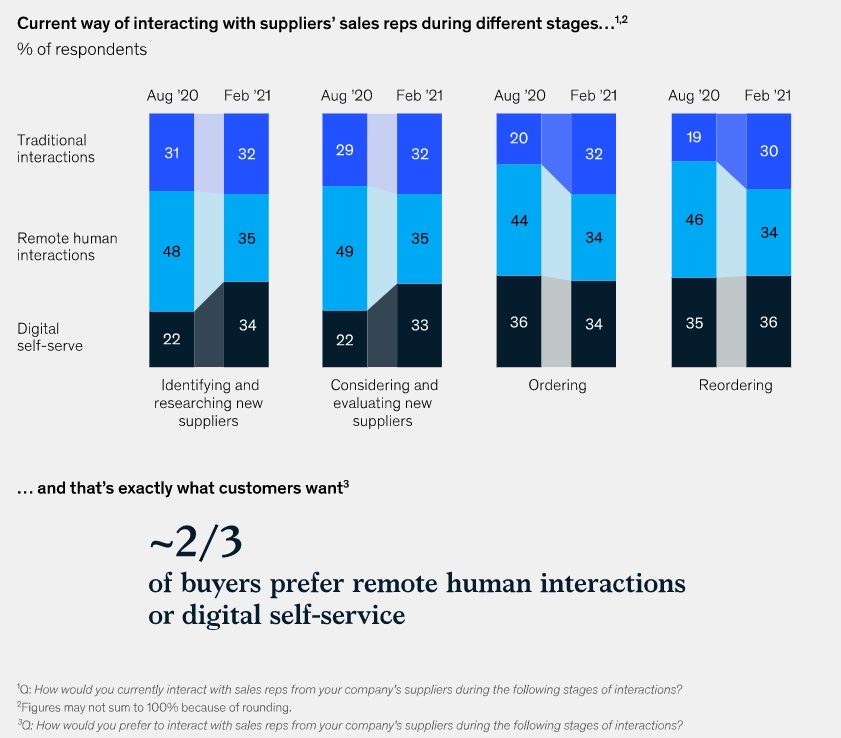
Source: McKinsey
In another study, 75% of B2B clients stated that they would buy from a firm again if they had omnichannel capabilities.
By investing in a B2B omnichannel experience, a company can provide a consistent experience to all its customers, regardless of which channel they use when interacting with the brand.
Understanding the Difference Between a Multichannel and Omnichannel Approach
Before diving further into what a B2B omnichannel experience is, it’s essential to take a moment to distinguish the difference between a multichannel and omnichannel approach.
The terms multichannel and omnichannel are often used interchangeably, despite being two very different approaches.
A multichannel approach involves leveraging various channels to communicate with and sell to customers. This approach typically provides B2B consumers with multiple channels that can be used for communication and education resources. However, there is often little consistency between the channels, and each is provided as an independent channel.
For instance, a company may provide a Twitter, Facebook, and Instagram account to communicate with customers, but each is presented as a stand-alone platform.
On the other hand, an omnichannel experience provides a more consistent approach to the B2B sales process. It encompasses a variety of channels and presents them as a cohesive unit.
For example, a company may provide Twitter, Facebook, and LinkedIn accounts that are used to communicate with customers, but these accounts are all managed by the same team, which ensures a consistent voice and message. This approach also allows for the easy integration of third-party platforms, such as email marketing, further enhancing the consumer experience.
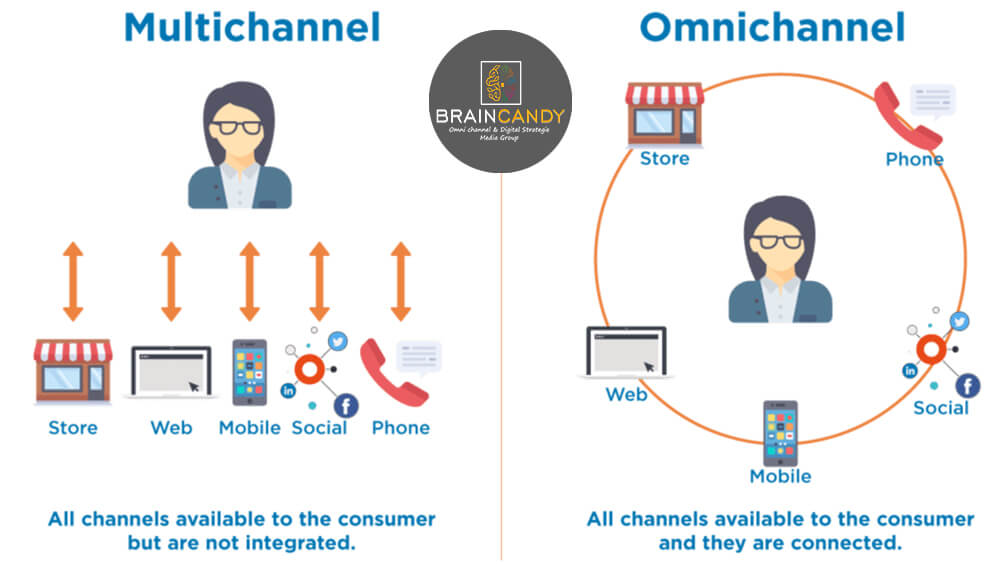
Source: BrainCandy
How Can a B2B Omnichannel Experience Benefit Your Overall Strategy?
Come 2028; the business-to-business ecommerce market is predicted to reach $25.65 trillion, expanding at a CAGR of 18.7% from 2021 to 2028. As a result, the B2B omnichannel experience has become an essential tool for companies hoping to capitalize on this unprecedented growth.
The ability to provide a consistent experience across various channels allows you to build and maintain a relationship with your customers. Customers who experience an omnichannel experience are more satisfied and loyal than those who interact with a brand through a single channel. Research shows that companies with a solid omnichannel strategy retain on average 89% of their existing customer compared to 33% of companies that don’t have a focus on creating an omnichannel experience.
This, in turn, helps to increase conversions and build a stronger brand. The result is a more efficient sales process, which allows you to scale your business rapidly.
What Does a B2B Omnichannel Experience Look Like?
With the average B2B customer now interacting with suppliers via 10 or more channels (double the channels used in 2016), the omnichannel experience has become a critical component of modern B2B marketing and sales strategies.
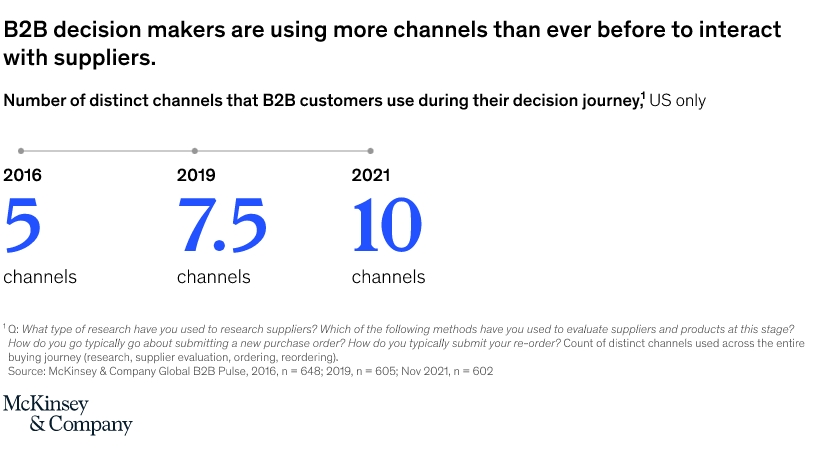
Source: McKinsey
While the exact format and design of an omnichannel experience will vary from company to company, the fundamental components of an omnichannel experience are essentially the same.
Each of the channels utilized within an omnichannel experience should be optimized for the specific goals of the channel. For example:
- An email marketing platform should be designed to increase signups
- A social media platform should be designed to increase followers
- A live chat platform should be designed to increase sales
Each of these channels should be designed to complement one another and be used in tandem to achieve the goals of the omnichannel experience.
More importantly, it should encourage collaboration between your marketing and sales teams. This not only provides your sales teams with the tools they need to close more deals, but it also provides your marketing team with the insight they need to create engaging content that will increase conversions.
It also allows your teams to generate a communication style that is cohesive and professional. When teams are able to work together, they can develop a consistent communication style and tone throughout the company, which is critical for building a strong brand. This, in turn, increases the perceived value of the brand and the perceived credibility of the company as a whole while also increasing your overall customer engagement and your bottom line.
Boost Your Customer Engagement with Hushly
Here at Hushly, we know just how vital it is to provide your customers with a well-rounded experience tailored to their unique needs. With our customer engagement solutions, you can provide your customers with the level of personalization and attention they deserve. In turn, this allows you to build a strong relationship with your customers and to boost your bottom line drastically.
From adaptive content hubs designed to present your audience with only the most relevant information to account-based experiences designed to drive maximum value from your customers’ interactions with your brand, Hushly enables your brand to provide your customers with the experience they deserve.
Ready to experience Hushly’s customer engagement solutions for yourself? Request your demo today!

